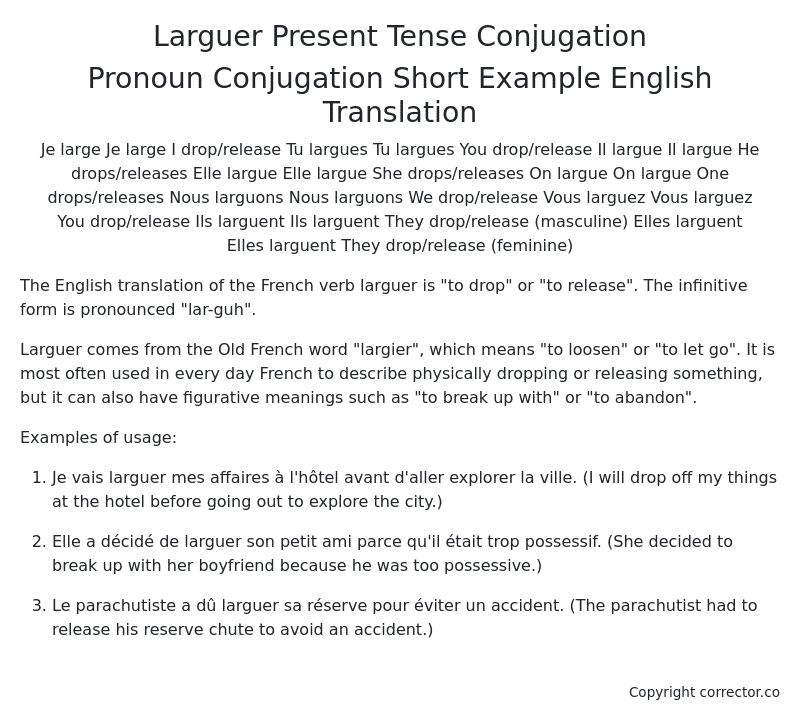Le Present (Present Tense) Conjugation of the French Verb larguer
Introduction to the verb larguer
The English translation of the French verb larguer is “to drop” or “to release”. The infinitive form is pronounced “lar-guh”.
Larguer comes from the Old French word “largier”, which means “to loosen” or “to let go”. It is most often used in every day French to describe physically dropping or releasing something, but it can also have figurative meanings such as “to break up with” or “to abandon”.
Examples of usage:
-
Je vais larguer mes affaires à l’hôtel avant d’aller explorer la ville. (I will drop off my things at the hotel before going out to explore the city.)
-
Elle a décidé de larguer son petit ami parce qu’il était trop possessif. (She decided to break up with her boyfriend because he was too possessive.)
-
Le parachutiste a dû larguer sa réserve pour éviter un accident. (The parachutist had to release his reserve chute to avoid an accident.)
Larguer – About the French Present Tense
To take a deep dive into all the French tenses then see our article on Mastering French Tense Conjugation.
Common Everyday Usage Patterns For Le Present
Interactions with Other Tenses
Table of the Present Tense Conjugation of larguer
Pronoun Conjugation Short Example English Translation
Je large Je large I drop/release
Tu largues Tu largues You drop/release
Il largue Il largue He drops/releases
Elle largue Elle largue She drops/releases
On largue On largue One drops/releases
Nous larguons Nous larguons We drop/release
Vous larguez Vous larguez You drop/release
Ils larguent Ils larguent They drop/release (masculine)
Elles larguent Elles larguent They drop/release (feminine)
Other Conjugations for Larguer.
Le Present (Present Tense) Conjugation of the French Verb larguer (this article)
Imparfait (Imperfect) Tense Conjugation of the French Verb larguer
Passé Simple (Simple Past) Tense Conjugation of the French Verb larguer
Passé Composé (Present Perfect) Tense Conjugation of the French Verb larguer
Futur Simple (Simple Future) Tense Conjugation of the French Verb larguer
Futur Proche (Near Future) Tense Conjugation of the French Verb larguer
Plus-que-parfait (Pluperfect) Tense Conjugation of the French Verb larguer
Passé Antérieur (Past Anterior) Tense Conjugation of the French Verb larguer
Futur Antérieur (Future Anterior) Tense Conjugation of the French Verb larguer
Subjonctif Présent (Subjunctive Present) Tense Conjugation of the French Verb larguer
Subjonctif Passé (Subjunctive Past) Tense Conjugation of the French Verb larguer
Subjonctif Imparfait (Subjunctive Imperfect) Tense Conjugation of the French Verb larguer
Subjonctif Plus-que-parfait (Subjunctive Pluperfect) Tense Conjugation of the French Verb larguer
Conditionnel Présent (Conditional Present) Tense Conjugation of the French Verb larguer
Conditionnel Passé (Conditional Past) Tense Conjugation of the French Verb larguer
L’impératif Présent (Imperative Present) Tense Conjugation of the French Verb larguer
L’infinitif Présent (Infinitive Present) Tense Conjugation of the French Verb larguer
Struggling with French verbs or the language in general? Why not use our free French Grammar Checker – no registration required!
Get a FREE Download Study Sheet of this Conjugation 🔥
Simply right click the image below, click “save image” and get your free reference for the larguer Present Tense tense conjugation!

I hope you enjoyed this article on the verb larguer. Still in a learning mood? Check out another TOTALLY random French verb present conjugation!


